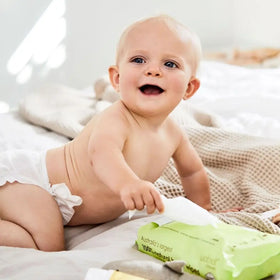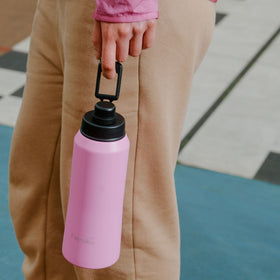
Preservatives in Skincare: Good Ones, Bad Ones and How to Avoid Altogether
You may think that if you are using natural and organic skincare, that you don't need preservatives. Certainly it's something that many of us are trying to avoid when we switch from mainstream skincare. Whilst many babies (and adults, too) may have reactions to different kinds of preservatives, those natural skincare products without preservatives (if affected by heat, moisture or even just over time) may deteriorate much more quickly due to environmental factors, become oxidized and and the bacterial growth rapidly multiplies. If your natural skincare has reacted in this way you may do as much, or even more, harm to yourself than using a harsh preservative.
So where does that leave you? If you're like many of us, your creams are in the bottom of your handbag or nappy bag along with food crumbs and hair from your hairbrush and old tissues in the heat of the car or the dampness of the bathroom shelf. You may forget to wash your hands, and dip your fingers into the product and before you know it, bacteria from your hands is swimming around in its cosy new environment and starts multiplying by the minute – then suddenly it becomes about more than just natural ingredients. That’s where preservatives come in.

Preservatives are used in products to keep them from spoiling, and to give your products a better chance at inhibiting the growth of harmful bacteria. As babies are much more sensitive than adults to all kinds of products, environmental factors, and especially chemicals, you want to make sure you’re thoroughly researching the ingredients of your organic baby skincare before you apply, and this definitely applies to preservatives, as well. So unless you’re making your own skincare (and you understand that these have a very short shelf-life!), you’ll want to:
1. avoid the toxic nasty preservatives
2. look for skincare with good preservatives but no parabens or other nasties; or
3. look for products that use natural preservatives, but be mindful of how you store and handle them;
4. alternatively, you can look for products that don't need preservatives.
Which preservatives should you always avoid?
Many of us are aware that we should be avoiding products containing parabens. Here's a list of preservatives that should always be avoided:
- Propylparaben, methylparaben, butylparaben, ethylparaben, isobutylparaben, isopropylparaben
- Bronopol (2-Bromo-2-Nitropropane-1,3-DIOL)
- DMDM Hydantoin
- BHA (butylated hydroxyanisole))
- Triclosan
- Methylisothiazolinone (MIT)
- Imidazolidinyl Urea
- Diazolidinyl Urea
- Quaternium-15
Under product safety labeling laws in Australia, ingredients must be listed in descending order. (Have you ever noticed that Aqua is usually the first ingredient on the list? That’s because most skincare ingredients are water based, especially cheaper products because water is cheap.) So your preservative will generally be down the bottom of that ingredients list. As an aside, the ingredients in perfumes or fragrance don't have to be listed, as they are considered 'commercially sensitive'. Which means that any product containing fragrance contains ingredients that you don't know about.
Which preservatives are considered safe?
We turn to Ecocert, the inspection and certification body for sustainable development, for their guidelines on natural and organic cosmetic standards. Ecocert approves the following synthetic preservatives:
- Benzoic acid and its salts
- Benzyl alcohol
- Dehydroacetic acid and its salts
- Salicylic acid and its salts
- Sorbic acid/potassium sorbate
- Sodium benzoate
- Potassium sorbate
Essential oils also contain properties that act as a natural preservative. Provided that you don’t have any allergic or sensitive reactions to some essential oils, they have antiseptic and anti-microbial properties that kill bacteria and fungi. Other popular natural preservatives include Sweet Orange Oil, Neem Oil and Rosemary Extract.
Preservatives vs Antioxidants
You may also see antioxidants in some products, such as Grapefruit Seed Extract, Rosemary Oleoresin Extract, and Vitamin E. These aren't preservatives. Preservatives are used to kill or inhibit bacteria, yeast and moulds. Antioxidants are used to prevent the oxidisation of oils and fats. So if you have a water based product, you're going to need preservatives, not antioxidants. If it's a water based product with antioxidants, it's going to have a short shelf life. The other problem is that many of these natural antioxidants are naturally derived but often go through a process of chemical synthesis to create the end product. These natural products are synthetically altered, and there can be contamination issues with these products. That's why it's so important to research the manufacturers of products, and make sure that they are a company you can trust.
How to Avoid Preservatives
One of the easiest ways to avoid preservatives in skincare is to choose products that are oil based, not water based. Choose a balm, a butter, or an oil: not a lotion. Although oil based or anhydrous products don’t need preservatives, many use an antioxidant to stop the oils from oxidizing and going rancid. It's always best to store oil based products in the fridge, as the cool temperatures will stop them from going rancid, too. And of course, don't forget that using less products means that you expose yourself to less ingredients. Only use products when you need them, rather than everyday out of habit. Always remember that ‘natural’ doesn't mean anything, so always read the ingredients on the back of the label rather than the greenwash on the front. If you're using a product for the first time on your baby, only use a small amount to start with and keep an eye out so that any adverse reactions are nipped in the bud as soon as possible.
What to look for
- Look for products that are certified organic by an independent certification body
- Look for products without water (or aqua, or eau)
- Use less products
These are the trusted brands to look for: Badger, Dr Bronner, Nature's Child, Weleda, and they're available at Hello Charlie.









